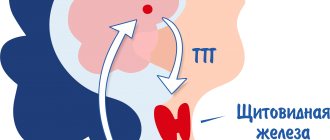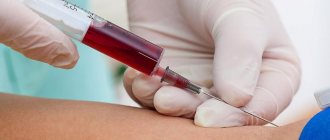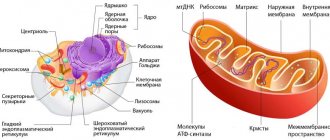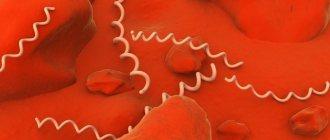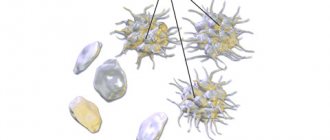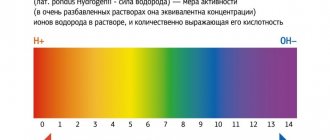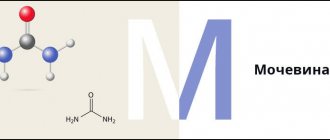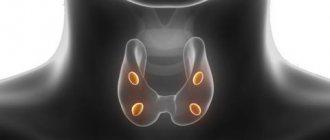Blood analysis
testing the concentration
of the hormone TSH
is a mandatory part of a comprehensive examination, which is prescribed by a doctor if a patient is suspected of having thyroid disease.
A blood test for the hormone TSH is the most important study in endocrinology. Click to make an appointment, ultrasound or tests
DETAILED DESCRIPTION OF BLOOD TEST FOR TSH HORMONE
If the level of thyroid-stimulating hormone is outside the normal range (decrease or increase), which will be shown in the results of the study, it will allow the specialist to confirm the presumptive diagnosis or make one.
General information about TSH
The content of the article
Thyroid-stimulating hormone is produced by a small gland located on the lower surface of the brain - the pituitary gland. It controls the formation of thyroid hormones (T3, T4) using feedback technology, ensuring a stable concentration of these substances in the blood. Thyroid hormones are considered the main controllers of energy expenditure that occurs in the human body. Maintaining their normal levels is very important for the healthy functioning of almost all systems and organs.
Why is a blood test for the hormone TSH performed?
A doctor may order a patient to take a thyroid-stimulating hormone blood test in the following situations.
- The need to check the condition of the thyroid gland, suspicion of the development of diseases associated with this organ in a person.
- The need for control over the treatment of thyroid diseases.
- To identify female infertility and select the optimal treatment method for this problem.
A blood test for the hormone TSH can be prescribed by a gynecologist or endocrinologist.
Indications for TSH analysis
As a rule, the doctor recommends that the patient take a blood test for the TSH hormone
with an increase in the size of the thyroid gland, in the presence of signs of hypothyroidism, hyperthyroidism.
Symptoms of hyperthyroidism may include:
- increased anxiety;
- cardiopalmus;
- reduction in body weight;
- hand trembling;
- insomnia;
- fatigue, chronic weakness;
- intolerance to bright light;
- diarrhea;
- dryness, swelling around the eyes, bulging, hyperemia;
- reduction in visual acuity.
Also, a TSH test must be performed if a patient has signs of hypothyroidism:
- constipation;
- dry skin;
- cold intolerance;
- hair loss;
- increased fatigue, constant weakness;
- disruptions of the menstrual cycle (in female patients).
Studying the level of thyroid-stimulating hormone in the patient’s body is a mandatory element of monitoring the effectiveness of the chosen treatment for thyroid diseases. TSH levels can also be checked in newborn infants if they belong to a risk group. A blood test for the TSH hormone is not performed for children at the Diana Clinic - it must be done in a children's clinic!
What the results say
The norm values depend on what indicators are used in a particular laboratory, therefore the interpretation
Only a doctor can
review test results The test may show an abnormal decrease or increase in the patient's TSH level.
Test results for the thyroid-stimulating hormone TSH may fall below normal in the following situations:
- cachexia;
- hyperthyroidism in pregnancy;
- mental illnesses, deviations;
- autoimmune thyroiditis with signs of thyrotoxicosis;
- Plummer's disease (thyrotoxic adenoma);
- TSH-independent thyrotoxicosis;
- diffuse toxic goiter.
Also, TSH levels may increase, exceeding the norm. Elevated
TSH test
results may indicate that the patient has the following problems:
- preeclampsia;
- mental illnesses, disorders;
- lead poisoning;
- adrenal insufficiency;
- lung tumors (thyrotropin-secreting);
- secondary or primary hypothyroidism;
- syndrome of unregulated secretion of thyroid-stimulating hormone;
- Hashimoto's thyroiditis;
- pituitary tumor (basophilic adenoma, thyrotropinoma).
An increase and decrease in thyroid-stimulating hormone levels indicates a malfunction of the patient’s thyroid gland. However, it is often not possible to accurately and correctly determine the cause of deviations using only a single analysis of the degree of concentration of TSH in the body. Therefore, along with this study, doctors often recommend that patients undergo tests for
triiodothyronine (T3), thyroxine
(T4).
How much does a TSH test cost?
Price
Testing
for thyroid-stimulating hormone
depends on the laboratory in which it is taken. At the Diana Clinic, a blood test for TSH without taking into account the cost of the discount is:
| [08-118] | Thyroid-stimulating hormone (TSH) | 400 rub. |
The cost of tests for other hormones can be found in the price list HERE. In the section “Blood Hormones”.
ADDITIONAL SERVICES AND ANALYSIS FOR TSH HORMONE ANALYSIS
What can affect the analysis results
As part of proper preparation for the test
blood test for TSH, the patient is obliged to exclude factors that can distort the results and lead to their incorrect
interpretation.
- The level of concentration of the TSH substance in the body reflects the picture in the “thyroid gland – pituitary gland” system on average over the last 5-6 weeks. Therefore, control diagnostics of thyroid-stimulating hormone levels in the blood should be carried out 2 months after the dose of drugs that can change the level of hormones is adjusted. Of course, such adjustments are made together with the attending physician.
- of TSH
in the body exceeding
the norm
in the
analysis
results: atenolol, motilium, phenytoin, valproic acid, amiodarone, propanolol, prednisolone, as well as methimazole, lovastatin, rifampicin, metoclopramide, iodides, and so on. The advisability of refusing them must be discussed with your doctor. - The level of concentration of the hormone TSH in the body can change if the patient experiences emotional shock or severe stress. Also, indicators may be distorted due to serious physical activity.
- Infectious diseases that the patient has recently suffered can change the indicators of this substance. You must notify your doctor about this.
- The concentration of TSH in the body may vary throughout the day. Therefore, if thyroid-stimulating hormone concentrations are being monitored, it is important to test for TSH hormone
at the same time of day. - If the purpose of the analysis is to monitor the effectiveness of the therapy, taking medications prescribed by the doctor is suspended immediately on the day of the study.
- TSH levels can increase in women in the third trimester of pregnancy.
What additional tests are prescribed?
Often, to identify pathology of the endocrine system, a more in-depth examination of the patient’s endocrine system is required. For this purpose, the following studies are prescribed, in addition to the TSH test in the blood:
- total triiodothyronine (T3 total) - its function is considered to be the regulation of energy (oxygen absorption by cells) and plastic metabolism in the body;
- total thyroxine (T4 total) - regulates energy and plastic metabolism in tissues;
- free thyroxine (free T4) - a biologically active portion of total thyroxine, which plays a major role in the metabolic process;
- free triiodothyronine (T3 free) - an active fraction of triiodothyronine not bound to plasma proteins, regulating the activity of basal metabolism, cell growth, metabolism of nutrients and microelements, as well as the activity of most body systems;
- antibodies to thyroid peroxidase (anti-TPO) - immunoglobulins against the enzyme of thyroid cells responsible for the production of the active form of iodine;
- antibodies to thyroglobulin (antiTG) are immunoglobulins that oppose the activity of the precursor of thyroid hormones.
After TSH and other tests, in addition to a visit to an endocrinologist, you may need to consult the following specialists: therapist, surgeon, gynecologist, pediatrician, neurologist.
Other important rules for preparing for a blood test for the TSH hormone
- It is highly advisable to donate blood for any hormonal analysis, including TSH, in the morning, always on an empty stomach. If it is not possible to submit biological material for research in the morning, this must be done at least 5 hours after eating.
- It is recommended to establish physical and psycho-emotional comfort a day before blood sampling. You can’t play sports (even light ones) or be nervous.
- Doctors do not recommend visiting a bathhouse or sauna or taking a hot bath in preparation for a thyroid-stimulating hormone test; overheating can distort the results of the study. Hypothermia is also prohibited, so activities such as going winter fishing or swimming in an ice hole are not allowed.
- 48 hours before the test, avoid drinking alcoholic beverages. Ideally, you should refrain from smoking for 24 hours before the test; if this is difficult, you should not smoke for 2-3 hours before taking blood.
- It is not recommended to donate blood for laboratory analysis immediately after an instrumental examination, physiotherapeutic procedures, ultrasound and x-ray examinations, massage and other medical procedures.
A blood test for the TSH hormone can only be taken in a good clinic!
Preparation for the procedure
It is extremely important to know how to take a TSH test , since taking preparatory measures will allow you to obtain the most reliable data. Preparation includes:
- 3 days before blood sampling, you need to give up alcoholic beverages, smoking, playing sports, and refrain from stress and temperature changes.
- Stop drug therapy (if possible and approved by your doctor).
- Before the procedure, do not have breakfast, maximum - a glass of still water. It is recommended to refrain from eating any food 12 hours before the test.
Before the TSH test
It is advisable to come to the laboratory about an hour or at least half an hour before taking blood. The patient should sit, rest, and relax. Concurrent testing for T4 hormones may be required.
T3 together with
TSH
in order for the doctor to obtain a complete picture of the disease; the rules for preparing for these studies are almost the same.
Women can donate blood for TSH, regardless of the phase of the menstrual cycle, unless otherwise indicated by the attending physician. About how soon a hormone test is done,
can be obtained from the specific laboratory.
How the research is carried out
Taking a TSH test is a universal procedure that does not require special medical instruments or equipment. It is carried out in all clinical laboratories (both paid and public). It is recommended to donate blood in the morning (from 8 to 11 am). The TSH concentration is determined using a chemiluminescent immunoassay on microparticles, which has a high level of accuracy. For this purpose, blood serum obtained from the patient’s vein is used. The procedure itself does not cause severe pain, but may be accompanied by minor discomfort. As a rule, you can get results within 1-2 business days. It is important to understand that the patient receives exclusively diagnostic data, without interpretation and diagnosis. This is done exclusively by the attending physician. If the TSH test is normal , then WHO recommends conducting the next examination no earlier than in a year. If there are problems with the thyroid gland, the frequency of the procedure should be increased to 2 times a year. You can get a TSH test at the medart clinic.
How to decipher a TSH analysis
Thyroid-stimulating hormone is known as the main regulator of the thyroid gland; if a patient is suspected of having a disease associated with it, a test for it is required. The interpretation of the analysis results should be done by a specialist, but knowledge of the basic values of the norm will allow the patient to independently gain an understanding of his problem.
How to interpret blood tests for the hormone TSH
Norm of the hormone TSH
test
results do not depend on the gender of the patient. However, the indicators vary depending on the norm, and the presence of pregnancy and trimester also have an impact. Normal results for each age group are indicated in µIU/ml.
- The normal level of thyroid-stimulating hormone for newborn babies is 0.7-15.2.
- Normal values for children aged 6 days - 3 months are 0.72 - 11.0.
- For children aged 4-12 months, the normal concentration of TSH in the body can be 0.73-8.35.
- Normal values of thyroid-stimulating hormone for children from one to six years old are in the range of 0.7-5.97.
- If a child is aged 7-11 years, normal levels of the TSH hormone for him are 0.6-4.84.
- For adolescents aged 12-18 years, the normal concentration of this substance in the body is 0.5-4.3.
- For people over 18 years of age, the normal levels of thyroid-stimulating hormone are in the range of 0.27-4.2.
Complexes with this research
Anti-aging diagnostics in postmenopause Control of age-related changes during the postmenopausal period 7,440 RUR Composition
Advanced male anti-aging diagnostics Advanced monitoring of key indicators in men aged 40+ 22,840 RUR Composition
Nutritionist recommends Metabolic status assessment RUR 4,200 Composition
IN OTHER COMPLEXES
- Fitness control of sports nutrition RUR 2,810
- Advanced women's anti-aging diagnostics RUB 19,540
- Male anti-aging diagnostics RUR 7,900
- Men's check-up No. 1 10,930 RUR
- Female hormones. Menopause RUB 1,270
Interpretation of tests and pregnancy
The level of concentration of thyroid-stimulating hormone in the female body may change due to pregnancy, which must be taken into account when interpreting the results of a blood test for TSH.
- Normal TSH levels before the 12th week of pregnancy are 0.35 – 2.5 µIU/ml.
- The level of this substance in the blood of a pregnant woman at 12-24 weeks of pregnancy is in the range of 0.35 - 3 µIU/ml.
- At 24-42 weeks of pregnancy the indicators are similar – 0.35 – 3 µIU/ml. During this period, it is also possible that the results will be slightly higher than normal.
Thyroid-stimulating hormone: normal
Normal TSH directly depends on the person’s age. For each age period, this value has different indicators, which is noticeably visible in the first months after birth. Reference values are:
| Age | TSH level, honey/liter |
| 4 days - half a year | 0,73–4,77 |
| half a year - 14 years | 0,7–4,17 |
| 14–19 years old | 0,47–3,41 |
| Over 19 years old | 0,4–4,0 |
As can be seen from the table, changes in normal TSH levels vary throughout life. Therefore, only a medical professional must make a conclusion based on the results of the analysis, comparing them with the norm. When deciphering, the endocrinologist can also take into account the characteristics of each organism, gender (according to statistics, women develop thyroid problems 2 times more often than men), a history of diseases, medications taken, and much more.
What does an elevated TSH mean?
If the indicators obtained as a result of a blood test for TSH
, exceed the norm, this may indicate that the patient has serious illnesses. The concentration of thyroid-stimulating hormone may increase in the following cases:
- pituitary tumor (for example, basophilic adenoma, thyrotropinoma);
- primary, secondary hypothyroidism;
- syndrome of unregulated secretion of the hormone TSH;
- Hashimoto's thyroiditis;
- adrenal insufficiency;
- lead poisoning;
- preeclampsia;
- thyrotropin-secreting lung tumors
- mental disorders, diseases.
It must also be remembered that the TSH
in the body may increase in the
test
results if the patient takes the following drugs as part of treatment: rifampicin, diphenin, methimazole, iodides, furosemides, metoclopramide, aminoglutethimide, benserazide, phenothiazine derivatives, morphine, prednisolone, calcitonin, as well as amiodarone, propranolone, valproic acid , metoprolol, motilium, clomiphene, atenolol and phenytoin.
Why is TSH low?
A decrease in TSH concentration in the blood may indicate:
• Deterioration of the pituitary gland function – after brain injuries, with hereditary diseases, infections, after severe bleeding;
• Hypothyroidism is a deterioration in the normal functioning and function of the thyroid gland, which may be associated with a tumor, iodine deficiency, protein deficiency, heredity, exposure to radiation and other reasons;
• Psychological stress;
• Abuse of thyroid hormones;
• Sheehan syndrome – partial death of cells in the pituitary gland in women after childbirth.
What does a decrease in TSH norm mean?
If the interpretation of test results for the hormone TSH
shows results that are below normal, the patient may assume the following problems and diseases:
- hyperthyroidism in pregnancy;
- thyrotoxic adenoma (also called Plummer's disease);
- diffuse toxic goiter;
- autoimmune thyroiditis with signs of thyrotoxicosis;
- TSH-independent thyrotoxicosis;
- cachexia;
- mental illnesses, disorders.
How to decipher the results of several tests for the hormone TSH
Deviations in the level of concentration of thyroid-stimulating hormone in the patient’s body from the norm in one direction or another directly indicate only malfunctions in the functioning of the thyroid gland. To determine the exact cause of such failures, the doctor, in most cases, together with a TSH test
prescribes tests for the patient for levels T3,
T4.
- Primary hypothyroidism is determined by normal or decreased T3 and T4, increased TSH.
- Secondary hypothyroidism is diagnosed when T3, T4, and TSH levels are reduced.
- Hyperthyroidism is determined by increased T3, T4, decreased TSH.
TPO-AT tests may also be required for accurate diagnosis of hypothyroidism or hyperthyroidism.
, AT-TG, exceeding the norm indicates subacute or autoimmune thyroiditis.
Thyrotropin is
Thyrotropin is a substance produced by cells in the anterior pituitary gland. It activates the production and release into the blood of these hormones produced by the thyroid gland. The hormone triggers the growth of thyroid cells and accelerates their division. The formation of TSH is triggered by the thyrotropin-releasing factor of the hypothalamus.
This process occurs when the level of hormones circulating in the blood decreases. TSH has an inverse logarithmic relationship with the T4 content in the blood. When T4 production levels increase, TSH decreases. And if the concentration of T4 decreases, TSH production increases.
This mechanism maintains the constant content of hormones at the required level. TSH secretion is regulated by neuronal mechanisms. Its speed changes during sleep, with a decrease in temperature, and nonspecific stress.
For TSH, daily changes in concentration are typical. The highest blood TSH values are achieved between 2 and 4 am. This level remains at these values from 6 to 8 am. The minimum TSH content is recorded at 17-18 hours.
The normal rhythm of TSH production and release during wakefulness at night is disrupted. Pathologies of the thyroid gland lead to a decrease in the level of thyroid hormones in hypothyroidism or to their excess content in the blood in hyperthyroidism.
The hormone stimulates the functioning of thyroid cells. This organ is located on the front of the neck and has the shape of a butterfly. Glandular tissue produces hormones that regulate most body functions. The most important among them are metabolism, body temperature, and heart rate.
The hormone TSH regulates the production of thyroid hormones by cells through a feedback mechanism. When T4 and T3 levels decrease, the pituitary gland produces more of the hormone. This way it stimulates the thyroid cells. With a high content of these substances, the pituitary gland reduces the intensity of TSH synthesis.
This mechanism maintains a constant level of thyroid hormones, as well as metabolic stability. When connections between the thyroid gland, hypothalamus and pituitary gland are disrupted, the functioning of the endocrine glands is disrupted. Situations arise when, with high levels of T3 and T4, thyroid-stimulating hormone continues to increase.
Thyroid-stimulating hormone activates blood supply to thyroid tissue. Iodine, which its cells need to function, is more actively absorbed. This element increases the production of thyroglobulin, triiodothyronine, thyroxine.
They are responsible for the metabolism of nutrients (proteins, fats, carbohydrates) in the body. Hormones also determine the functioning of the digestive and reproductive systems. The functioning of the circulatory system and higher nervous activity depend on them. Both deficiency and excess of TSH, as well as the level of thyroid hormones, affect the condition of the human body.
